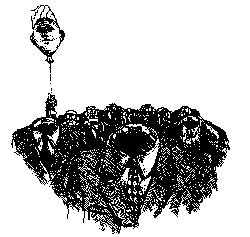 The confidentiality surrounding the findings of the Judicial Inquiry Commission on Property (JIPC) makes you wonder how we've suddenly become so good at keeping secrets. We've heard little from the authors since they submitted the 878-page report to King Gyanendra over a week ago. Enough, though, to understand that the panel has carefully probed and profiled personalities who it believes have profited the most from the restoration of multiparty democracy. (By the way, how many of us want the list made public so we can rate the accuracy of our personal rosters of sleaze-bags?)
The confidentiality surrounding the findings of the Judicial Inquiry Commission on Property (JIPC) makes you wonder how we've suddenly become so good at keeping secrets. We've heard little from the authors since they submitted the 878-page report to King Gyanendra over a week ago. Enough, though, to understand that the panel has carefully probed and profiled personalities who it believes have profited the most from the restoration of multiparty democracy. (By the way, how many of us want the list made public so we can rate the accuracy of our personal rosters of sleaze-bags?) Commission chief Bhairab Prasad Lamsal says he has made a strong recommendation for necessary action against the officials. Panel member Gyaindra Bahadur Shrestha insists that naming names would be a clear violation of the right to property envisioned in the constitution. Prime Minister Lokendra Bahadur Chand's to-do list just seems to be getting longer.
With the United Nations working on a global treaty to combat corruption, the time is propitious for our own house cleaning. As a responsible member of the community of nations, we must play our part to ensure that all governments have sufficiently strong laws to criminalise corrupt practices, to track down and confiscate ill-gotten gains and to protect witnesses. However, we must think locally and concede how money pumps life into our liberties.
Some politicos have warned us that the JIPC report may become another tool in the arsenal against democracy. This time they could be right. The panel's cut-off date of 1990 doesn't mean the panchas were paragons of probity. So the sneers from that side don't amount to much. We should be troubled by the clear disadvantage the report puts our multiparty politicians at.
They won't say so during on-the-record sessions, but our leaders have had a fervent plea since the Dhamija-scam days. If the people want political parties to live a healthy life, they must help them find ways of raising funds that bypass the realm of shadiness. For a clearer perspective, let's consider some of the impediments to a career in public service. The field is off limits to those unable or unwilling to make clear investment decisions. Such tactics as capturing booths and stuffing ballot boxes may fall under the law-and-order category. Paying off competitors to stay out of the race and dispensing the precise mix of patronage and persuasion to carry swing constituencies require hard cash. And we haven't even started talking about pampered supporters supposed to run the campaigns.
Moreover, considering that no MP elected in the last dozen years has succeeded in serving a full five-year term, budgeting becomes riskier. From a macro-economic standpoint, when the internal rate of return is so unpredictable, can our politicians be faulted for considering corruption a compulsion?
True, the profligacy of the political class, not the transparency of fund-raising, is our primary concern here. You can't tackle one without tailing the other. We gave up the luxury of blaming the system in 1990 and the ensuing years of deepening denial have edified impunity. With each broken barrier, the fence between public and private aggrandisement has become fuzzier. When parties become institutions that owe a large part of their influence to personal patronage networks, failure to deliver contracts, jobs, transfers and scholarships to clients becomes the shortest route to disenfranchisement.
It's no coincidence that things started going downhill for the mainstream parties once prominent entrepreneurs began warning politicians not to count on their money in the next elections. The Maoists, described as one of Asia's wealthiest rebel movements, have begun interacting with the captains of commerce. In a new book, The Future of Freedom, Fareed Zakaria attempts to address some of these dilemmas by making a distinction between democracy and liberty. His assertion that democracy is now spreading at the expense of liberty by feeding ethnic hatreds, precipitating wars or undermining the institutions of liberty sounds pretty much like what the reactionary right has been insisting since Saat Sal.
Before you marvel at Zakaria's mastery of the Nepali malaise, consider his verdict: Countries need a history of building liberty and a per-capita income of at least $5,000 if they are to begin sustaining liberal democracy. That may help explain why a third of our tainted 2,000 are thought to be politicians.


